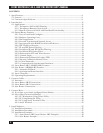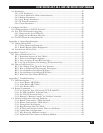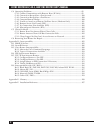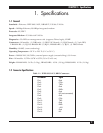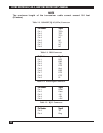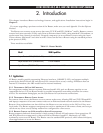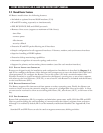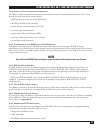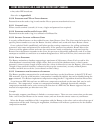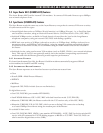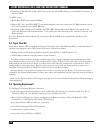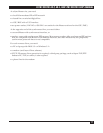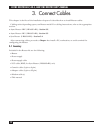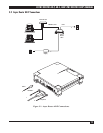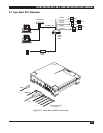
ASYNC ROUTER AR-P, AR-5, AND SYNC ROUTER USER’S MANUAL
14
• Any other IPX broadcasts.
Also refer to Appendix B.
2.2.10 P
ASSWORDS FOR FTP AND TELNET SERVERS
Passwords must be used to log in and transfer files to prevent unauthorized access.
2.2.11 C
ONSOLE LOGIN
When a serial terminal (console) is in use, a login and password are required.
2.2.12 P
ASSWORDS FOR ROUTERVU LOGINS (IPX)
Passwords must be used to log in to a Router with RouterVu.
2.2.13 S
ECURITY CALLBACK TO REMOTE USERS
A security callback feature can be enabled for any Async Router client. The client must be located at a
specific phone number to access the Router. Security callback only works with Async Router clients.
Once a physical link is established, and before packet routing commences, the calling workstation
presents a user name and password for authenticity. If the password is authentic, Router directs the
client to end the phone session and enter into auto-answer mode, anticipating a response from the
Router. Once the Router responds to the client, the process to determine authenticity ends. If a client
attempts to establish a connection to a modem designated as a LAN-to-LAN line, the connection fails.
2.2.14 C
LIENT PASSWORDS
The Router maintains a database supporting a maximum of 100 remote clients. Each record in this
client database is associated with a single client. Each record of the database stores a client’s name,
password, connect quota (length of time each day a client is allowed to access the Router), idle timeout
(length of time network inactivity is allowed to keep up the connection), security callback phone
number, and shift access choice (access based on time of day).
2.2.15 C
OMPRESSION FOR SYNCHRONOUS INTERFACES
The Router provides compression for synchronous interfaces on the Sync Router, in both TCP/IP and
IPX networks. For the sync0 interface, compression is enabled by default, but can be disabled using the
ppp command. The Router implements compression using Stacker™ algorithms from Stat Electronics.
A synchronous PPP link can have two different compression methods on the same link, one in each
direction. “No compression” counts as a compression method. Although theoretically multiple
compression methods can be active across each direction of a PPP link, the Router supports only one
method of compression per direction on a link.
Example:
For example, suppose your Router is linked to a remote router. There are two connections on the same
links: one from your Router to the remote router, and one from the remote router to your Router.
When the Router establishes a link, it negotiates with the Router at the other end to select what type of
compression will be used. During the negotiation, the Router will indicate a preference for the Stacker
compression method.



